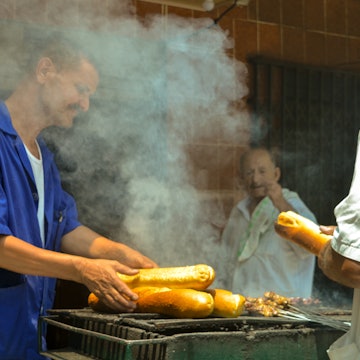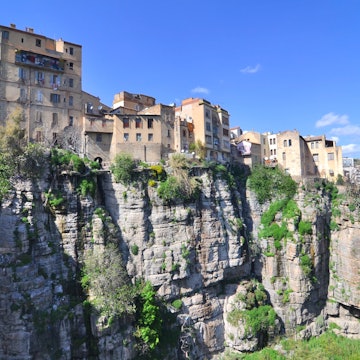
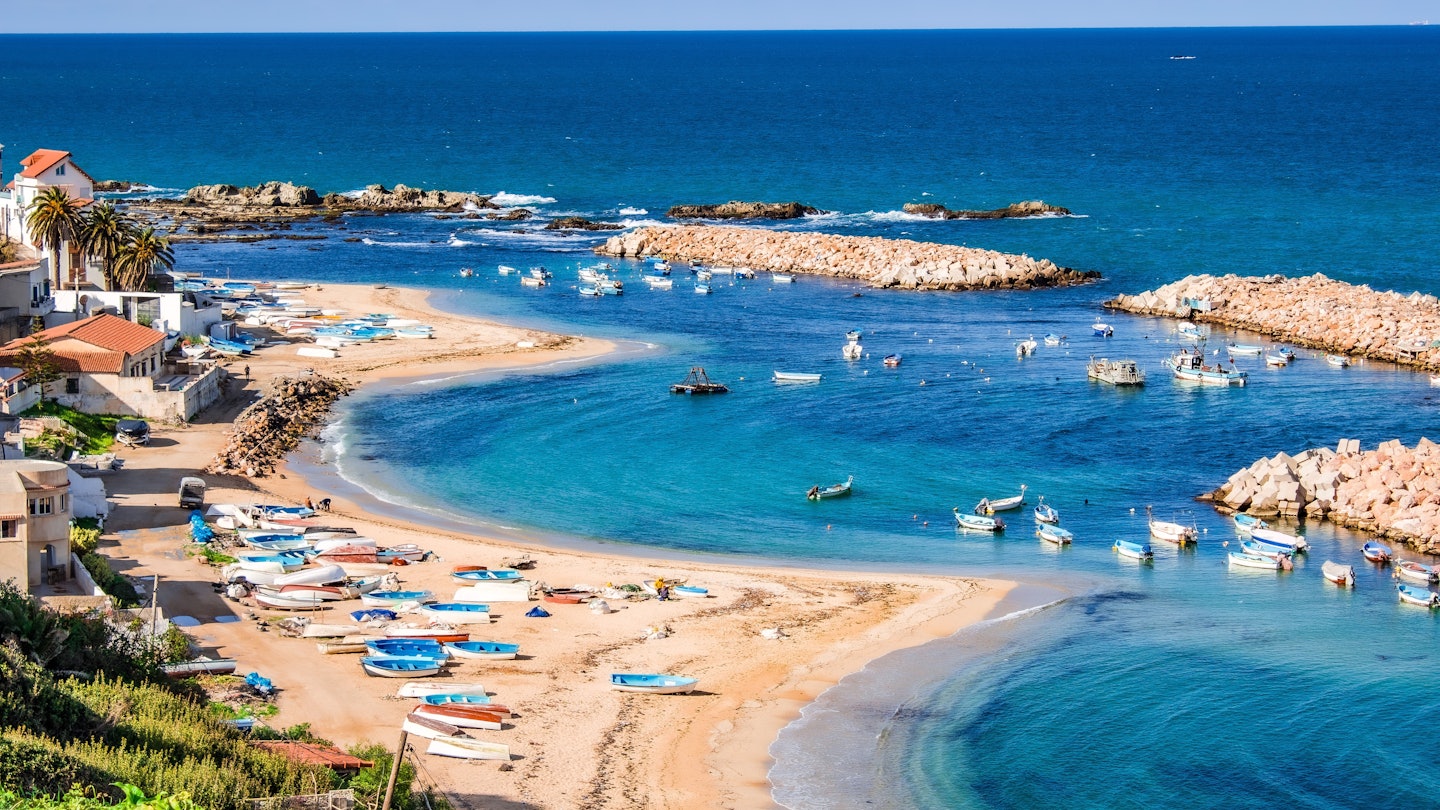
Algeria's Mediterranean coastline. Cherihaneee/Shutterstock
From the 1200km-long (746-mile) strip of shimmering Mediterranean beaches in the north to the snow-capped mountains and vast Sahara Desert, Algeria has something to capture the wildest of imaginations. Here, big cities – combining thousands of years of architecture – stand witness to the passing of civilizations, and with all the delicious cuisine and sweets, you can count on being fed well.
But first-time visitors might still struggle to navigate Algeria without a little preparation. Plan an unforgettable trip with this guide to planning, etiquette, health and safety, and culture.
Planning your trip to Algeria
1. You probably need a visa to travel to Algeria
Most foreigners – including citizens of the US, the EU and the UK – need a visa to visit Algeria. Consult the website of the Algerian diplomatic or consular mission in your country of residence to obtain up-to-date information and apply well in advance. The visa process involves several documents submitted in hard format in person or via courier.
The good news is you can also get a visa on arrival, known as a Regularization Visa, if you are traveling to the Sahara region in Southern Algeria with a tour agency licensed by the Ministry of Tourism and Handicrafts. The agency will issue you a “boarding authorization” to board the plane and then you can get a visa on arrival once you land in Algeria. Talk to your tour agency about the possibility of traveling north after completing the minimum number of days required in the south.
Visa on arrival fees vary depending on the number of days you are planning to stay, starting at €110 (US$128).

2. The best time of year to visit depends on what you want to do
It is very important to define what kind of activities you are hoping to engage in before choosing the time of year to visit Algeria. The ideal period to visit the Sahara, for example, is October through April when the weather is pleasant and scorpions are dormant.
The summer period is great for coastal areas in the north where you can enjoy the long strip of beautiful Mediterranean beaches, with June and September being ideal to avoid the influx of domestic and diaspora tourists and increase in prices. Nature lovers may opt for the spring or autumn seasons if they want to hike through mountain trails in the interior region, experiencing the beautiful Djurdjura and Aures Mountain ranges and the rich Berber culture and hospitality.
Tourists have typically steered away from visiting Algeria during Ramadan as restaurants are closed during the day and activity slows down in general. But Ramadan is also a period of intense evening cultural activities, particularly in urban areas, with concerts and shows everywhere, every night. Downtown streets throb with people out shopping, eating and enjoying live music and some tourist attractions, including museums, open their doors until midnight.
3. Algeria is a cash economy, so bring enough cash to cover your expenses.
While the county has made strides in terms of digital transformation, cash remains the primary method of payment. Nowadays, card payment is possible at major stores, restaurants and hotels, but this is limited to local bank cards only. Very few vendors take international Visa or Mastercard, with a limited number of international hotels and restaurants accepting them. There are not many ATMs in the country that work with credit cards outside major hotels, so be sure to bring enough cash to cover your trip expenses. There is no limit to how much cash you can bring into the country, but foreign nationals are required to declare amounts greater than €5000 (US$5840) or equivalent in other currencies. More information can be found on Algeria's customs website.
To exchange your cash for local currency (Algerian Dinars or DZD), visit a bank, either at the airport or out in the city, where you will be offered official exchange rates. While illegal, many tourists do opt to use informal currency exchanges for more favorable rates.
Dinars cannot be taken out of the country, so plan your finances accordingly and use anything you have left at the end of your trip on souvenirs.
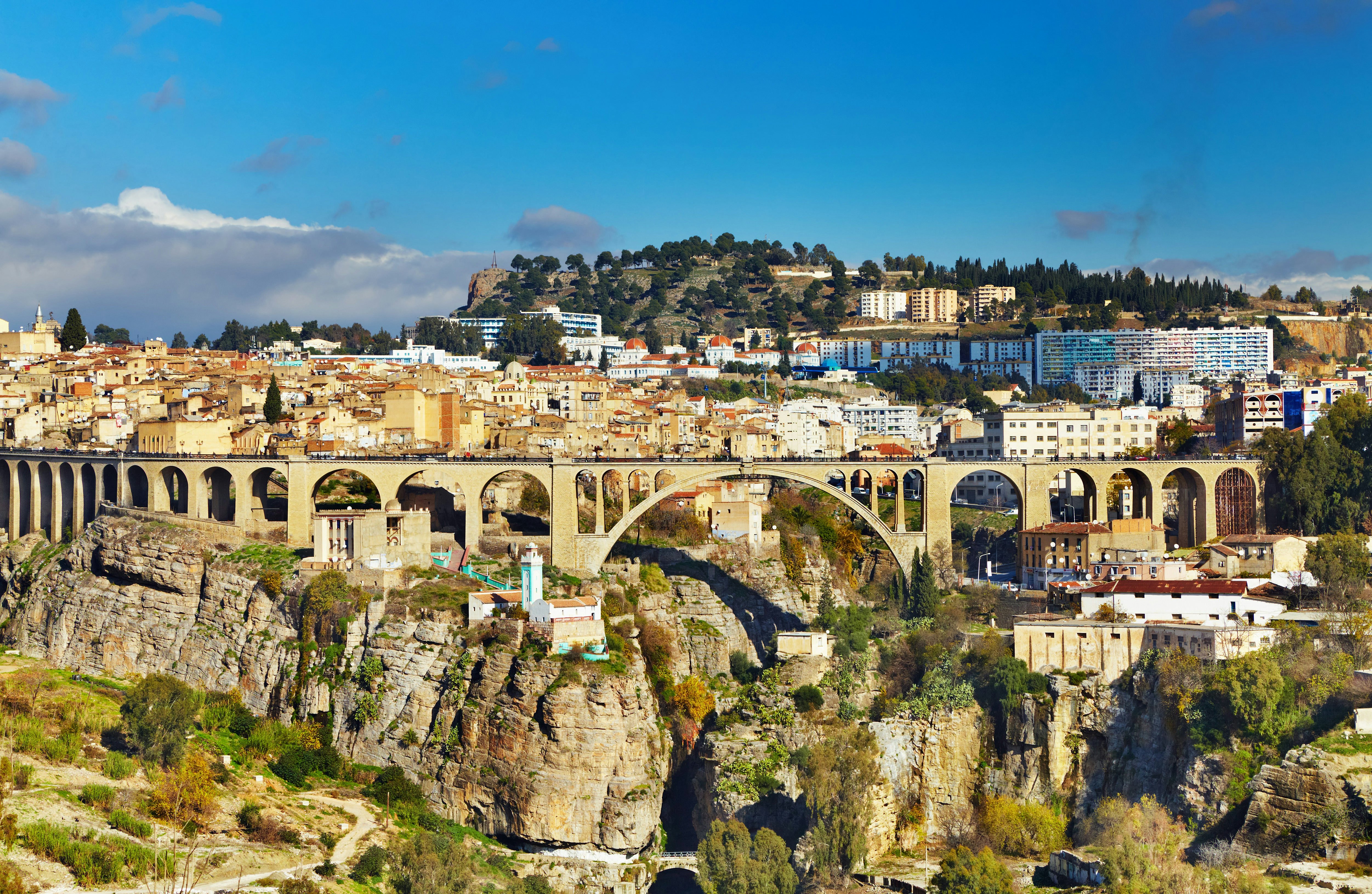
Health and safety in Algeria
1. Algeria is a safe country to visit
Outdated misconceptions from the civil war years in the 1990s and lack of proper representation on mainstream media might have contributed to the negative image that Algeria is an unsafe place to visit. The US Government’s travel advisory changed Algeria’s status from Category 3 to 2 in September 2024, though it still warns against travel to rural areas close to eastern and southern borders and overland travel to the Sahara Desert, advising air travel instead.
Crime rates in Algeria’s urban centers is moderate, equivalent to similar settings around the world. As such, travelers should watch out for pickpockets or purse-snatching when walking on the street or frequenting crowded venues. There is a visible law-enforcement presence throughout the country, and you can call the police by dialing 1548 from a local number, or 1055 for the gendarme (typically when outside of urban areas).
2. Solo women travelers may receive unwanted attention
Unfortunately, women may face unwanted attention in public if not accompanied by a male, and foreign-looking women may attract even greater curiosity from strangers eager to engage in conversation. When walking on the street, ignore any unsolicited approaches from strangers and seek help from the police or shopkeepers if you feel uncomfortable. Apply similar cautionary measures as in other parts of the world: avoid walking alone at night and steer away from empty or dark streets. The presence of other women and children is a sign of safety.
3. Health care facilities are adequate
You can count on accessing adequate health services, though quality might vary from one place to another. Having a local with you will help with translation and navigating the process. You can also opt for private clinics where you will pay for medical care – there is less demand for these and the services are faster. Pharmacies are plentiful and well-stocked too.
Keep aside some cash for medical emergencies and secure adequate travel health insurance. In case of emergency, call an ambulance by dialing 16 from a local number.

Local etiquette in Algeria
1. Bring clothes that cover shoulders and knees
Algeria is a mostly conservative country though dress code may vary depending on areas. Many women wear the veil and hijab, but it’s not mandated by law and many choose not to. You are still not likely to spot many women sporting shorts or cropped tops, though. Female travelers are advised to cover their shoulders and wear long pants or skirts. If visiting a religious site, women are expected to cover their heads, too, and men should wear something with a hem lower than their knees.
On certain beaches, particularly in big cities, it is common to see women swimming in bikinis and one-piece suits. However, the general rule for "family-friendly" beaches is for women to swim in shorts and a t-shirt instead of a bikini. These beaches are not identified with signs, so the best way to know what is acceptable is to ask a local or tour agent.
2. Public affection is not acceptable
Public displays of affection is not accepted and may get you in trouble with the law, particularly among unmarried couples. It’s common to see couples holding hands or hug by way of greeting, but that’s the extent to which society can tolerate in public.
3. Some city restaurants and hotels serve alcohol
Drinking in Algeria is done behind closed doors. You are more likely to find alcohol at select hotels, restaurants and bars in major cities than in rural areas, but they are typically discrete about it or limit access to their facilities.

4. You’re not expected to tip, but you can sometimes haggle
Tipping isn’t common in Algeria, and while some high-end hotels and restaurants with frequent foreign travelers might be more used to it, it is still not an expectation.
When shopping at a traditional market, you might try haggling for a 5–10% discount, particularly for clothes, souvenirs and carpets, but don’t base your personal pride on the transaction, just make a friendly effort. Artisanal stores are less likely to give you a discount, especially when you are buying handmade items. A lot of hours and care go into the making of these goods, and artisans take their trade very seriously. You are likely to find artisans in well-established workshops or at fairs organized by local authorities for them to sell their work. In many cities, particularly in the south, keep an eye out for the "Chamber of Handicrafts," a government space for licensed vendors to sell their products.
In all cases, be civil and respectful yet don’t hesitate to politely decline and walk away if you can’t reach an agreement on the price.
5. Don’t take pictures of government buildings or people on the street
When roaming the streets in Algeria, seeking those Instagram-able views, be aware that government buildings, such as police and gendarme stations, and military facilities are off limits for photos. Do not take pictures or videos of uniformed officers or their cars. Also, try to avoid capturing strangers in your photography without permission, particularly women, as some are not comfortable having their faces posted online.
6. It's OK if you get something wrong!
Most importantly, do not worry about getting something wrong. As a foreigner, people will cut you a lot of slack, particularly if they notice you are making an effort to be mindful of the local culture. They will often ask for a photo together, to mark the novelty of meeting an enthusiastic visitor to their country.
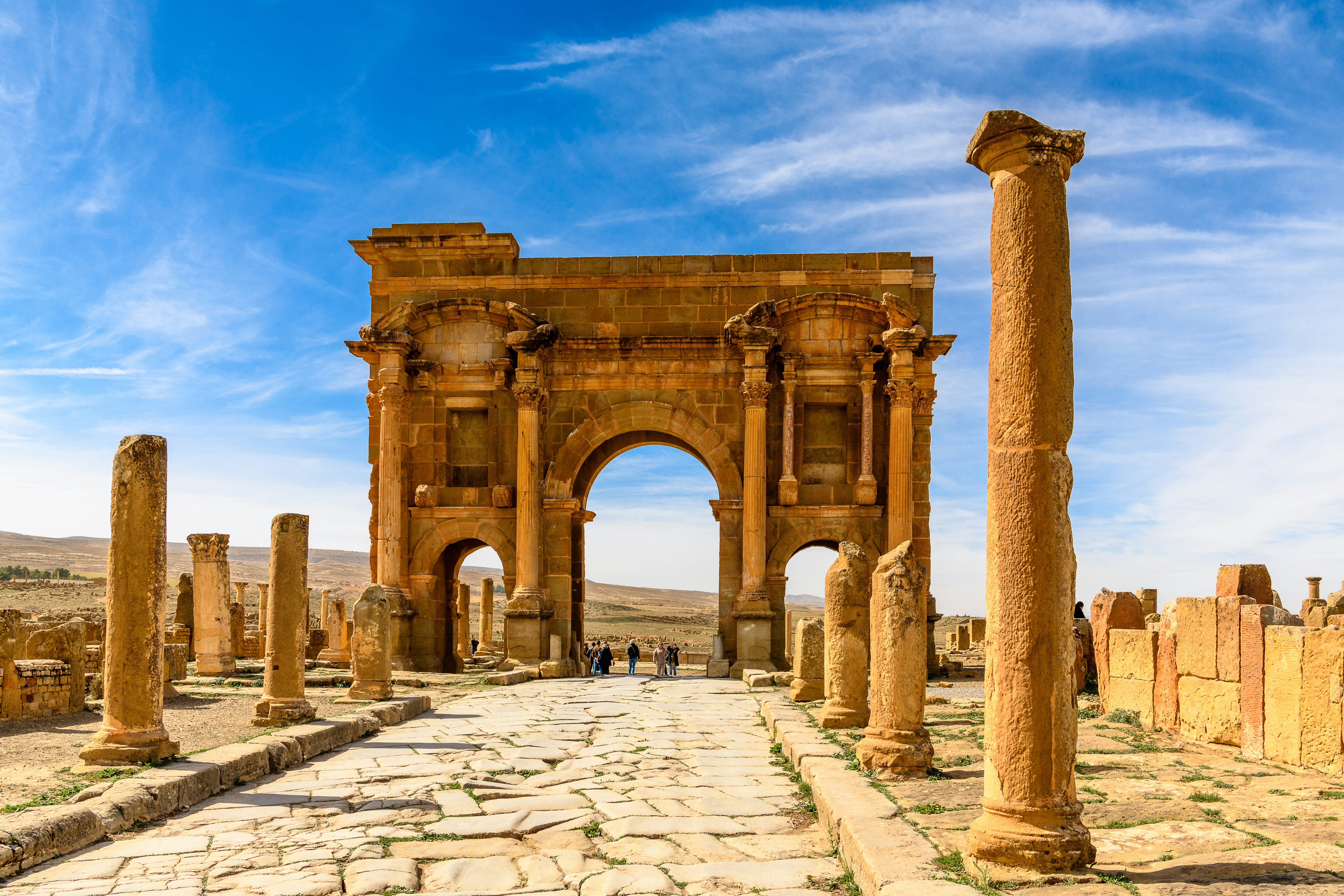
Making the most of the travel experience in Algeria
1. Take advantage of the country's diversity
Algeria has a lot to offer in terms of landscapes, sightseeing and culture. In addition to the sea, mountains and desert, the country has been home to several civilisations over the millennia leaving a wealth of cultural heritage ranging from prehistoric rock art to Roman ruins (including functioning Roman baths!), Ottoman architecture, and French colonial cities. Spanish influence is also visible out west and in other parts of the country. This intersection of cultures creates a unique travel experience. Allocate part of your time to visiting museums and cultural heritage sites to understand the complex history of the country and appreciate the remnants of past civilisations.
2. Be flexible
Plans will almost certainly change a number of times, usually without proper communication, so it helps to be flexible and go with the flow. When dealing with service staff or officers at government facilities, keep calm and positive – modesty and kindness will get you much further than a negative attitude.
3. Algerians are welcoming and generous
One of the best experiences on a trip to Algeria is letting yourself wander off and mingle with the locals. You will most likely stand out as a tourist, and people will ask where you are from and whether you like Algeria. Learning basic words like saha for “thank you” or bnine (masculine) or bnina (feminine) for “tasty” will win you immediate friends.
What is most certain is that you will experience Algerian kindness and generosity. You may be surprised by how many people will go out of their way to help you out, share the beauty of their country with you, or simply show you a good time without expecting anything in return.







